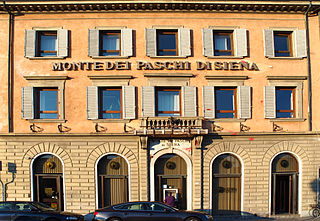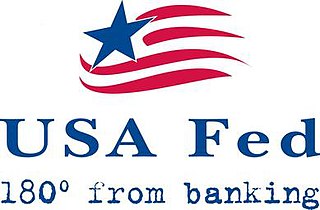Business is the practice of making one's living or making money by producing or buying and selling products. It is also "any activity or enterprise entered into for profit."

A financial institution, sometimes called a banking institution, is a business entity that provides service as an intermediary for different types of financial monetary transactions. Broadly speaking, there are three major types of financial institution:
- Depository institution – deposit-taking institution that accepts and manages deposits and makes loans, including bank, building society, credit union, trust company, and mortgage broker;
- Contractual institution – insurance company and pension fund
- Investment institution – investment bank, underwriter, and other different types of financial entities managing investments.

A credit union is a member-owned nonprofit cooperative financial institution. They may offer financial services equivalent to those of commercial banks, such as share accounts, share draft accounts, credit cards, credit, share term certificates, and online banking. Normally, only a member of a credit union may deposit or borrow money. In several African countries, credit unions are commonly referred to as SACCOs.

A limited liability company (LLC) is the United States-specific form of a private limited company. It is a business structure that can combine the pass-through taxation of a partnership or sole proprietorship with the limited liability of a corporation. An LLC is not a corporation under the laws of every state; it is a legal form of a company that provides limited liability to its owners in many jurisdictions. LLCs are well known for the flexibility that they provide to business owners; depending on the situation, an LLC may elect to use corporate tax rules instead of being treated as a partnership, and, under certain circumstances, LLCs may be organized as not-for-profit. In certain U.S. states, businesses that provide professional services requiring a state professional license, such as legal or medical services, may not be allowed to form an LLC but may be required to form a similar entity called a professional limited liability company (PLLC).

A sole proprietorship, also known as a sole tradership, individual entrepreneurship or proprietorship, is a type of enterprise owned and run by only one person and in which there is no legal distinction between the owner and the business entity. A sole trader does not necessarily work alone and may employ other people.
Bank of America Home Loans is the mortgage unit of Bank of America. It previously existed as an independent company called Countrywide Financial from 1969 to 2008. In 2008, Bank of America purchased the failing Countrywide Financial for $4.1 billion. In 2006, Countrywide financed 20% of all mortgages in the United States, at a value of about 3.5% of the United States GDP, a proportion greater than any other single mortgage lender.
A mortgage broker acts as an intermediary who brokers mortgage loans on behalf of individuals or businesses. Traditionally, banks and other lending institutions have sold their own products. As markets for mortgages have become more competitive, however, the role of the mortgage broker has become more popular. In many developed mortgage markets today,, mortgage brokers are the largest sellers of mortgage products for lenders. Mortgage brokers exist to find a bank or a direct lender that will be willing to make a specific loan an individual is seeking. Mortgage brokers in Canada are paid by the lender and do not charge fees for good credit applications. In the US, many mortgage brokers are regulated by their state and by the CFPB to assure compliance with banking and finance laws in the jurisdiction of the consumer. The extent of the regulation depends on the jurisdiction.

The Real Estate Settlement Procedures Act (RESPA) was a law passed by the United States Congress in 1974 and codified as Title 12, Chapter 27 of the United States Code, 12 U.S.C. §§ 2601–2617. The main objective was to protect homeowners by assisting them in becoming better educated while shopping for real estate services, and eliminating kickbacks and referral fees which add unnecessary costs to settlement services. RESPA requires lenders and others involved in mortgage lending to provide borrowers with pertinent and timely disclosures regarding the nature and costs of a real estate settlement process. RESPA was also designed to prohibit potentially abusive practices such as kickbacks and referral fees, the practice of dual tracking, and imposes limitations on the use of escrow accounts.
The CAMELS rating is a supervisory rating system originally developed in the U.S. to classify a bank's overall condition. It is applied to every bank and credit union in the U.S. and is also implemented outside the U.S. by various banking supervisory regulators.
A non-banking financial institution (NBFI) or non-bank financial company (NBFC) is a financial institution that is not legally a bank; it does not have a full banking license or is not supervised by a national or international banking regulatory agency. NBFC facilitate bank-related financial services, such as investment, risk pooling, contractual savings, and market brokering. Examples of these include hedge funds, insurance firms, pawn shops, cashier's check issuers, check cashing locations, payday lending, currency exchanges, and microloan organizations. Alan Greenspan has identified the role of NBFIs in strengthening an economy, as they provide "multiple alternatives to transform an economy's savings into capital investment which act as backup facilities should the primary form of intermediation fail."
Consumer protection is the practice of safeguarding buyers of goods and services, and the public, against unfair practices in the marketplace. Consumer protection measures are often established by law. Such laws are intended to prevent businesses from engaging in fraud or specified unfair practices to gain an advantage over competitors or to mislead consumers. They may also provide additional protection for the general public which may be impacted by a product even when they are not the direct purchaser or consumer of that product. For example, government regulations may require businesses to disclose detailed information about their products—particularly in areas where public health or safety is an issue, such as with food or automobiles.
Bank regulation in the United States is highly fragmented compared with other G10 countries, where most countries have only one bank regulator. In the U.S., banking is regulated at both the federal and state level. Depending on the type of charter a banking organization has and on its organizational structure, it may be subject to numerous federal and state banking regulations. Apart from the bank regulatory agencies the U.S. maintains separate securities, commodities, and insurance regulatory agencies at the federal and state level, unlike Japan and the United Kingdom. Bank examiners are generally employed to supervise banks and to ensure compliance with regulations.

A bank is a financial institution that accepts deposits from the public and creates a demand deposit while simultaneously making loans. Lending activities can be directly performed by the bank or indirectly through capital markets.
The New York State Banking Department was created by the New York Legislature on April 15, 1851, with a chief officer to be known as the Superintendent. The New York State Banking Department was the oldest bank regulatory agency in the United States.

Credit unions in the United States served 100 million members, comprising 43.7% of the economically active population, in 2014. U.S. credit unions are not-for-profit, cooperative, tax-exempt organizations. The clients of the credit unions become partners of the financial institution and their presence focuses in certain neighborhoods because they center their services in one specific community. As of March 2020, the largest American credit union was Navy Federal Credit Union, serving U.S. Department of Defense employees, contractors, and families of servicepeople, with over $125 billion in assets and over 9.1 million members. Total credit union assets in the U.S. reached $1 trillion as of March 2012. Approximately 236,000 people were directly employed by credit unions per data derived from the 2012 National Credit Union Administration (NCUA) Credit Union Directory. As of 2019, there were 5,236 federally insured credit unions with 120.4 million members, and deposits of $1.22 trillion.
Selling away in the U.S. securities brokerage industry is the inappropriate practice of an investment professional who sells, or solicits the sale of, securities not held or offered by the brokerage firm with which he is associated (affiliated). An example of the term expressed in a sentence is, "The broker was selling investments away from the firm." Brokers marketing securities must have obtained the appropriate securities licenses for various types of investments. Brokers in the U.S. may be "associated" with one or more Brokerage firms and must obtain licenses by passing standardized Financial Industry Regulatory Authority (FINRA) exams such as the Series 6 or Series 7 exam. See List of Securities Examinations for types of securities licenses in the U.S.

United Services of America Federal Credit Union was a credit union headquartered in San Diego, California, chartered and regulated under the authority of the National Credit Union Administration (NCUA) of the U.S. federal government.

First Entertainment Credit Union is a state-chartered, natural person (retail) credit union – a cooperative financial institution that is owned and controlled by its members and operated for the purpose of providing credit at competitive rates and other financial services to its members. Headquartered in Hollywood, California, First Entertainment Credit Union is regulated under the authority of both the California Department of Financial Protection and Innovation (DFPI) and the National Credit Union Administration (NCUA), an agency of the U.S. federal government.
The Dodd–Frank Wall Street Reform and Consumer Protection Act was created as a response to the financial crisis in 2007. Passed in 2010, the act contains a great number of provisions, taking over 848 pages. It targets the sectors of the financial system that were believed to be responsible for the financial crisis, including banks, mortgage lenders, and credit rating agencies. Ostensibly aimed at reducing the instability that led to the crash, the act has the power to force these institutions to reduce their risk and increase their reserve capital.






